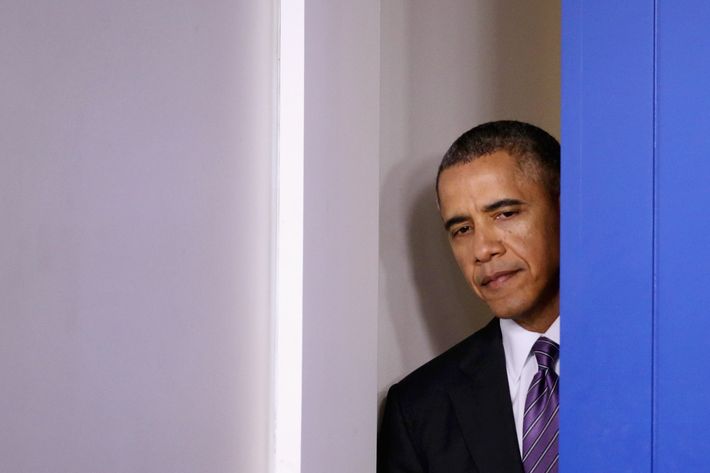
Since at least October, the assumption has held that the midterm elections will revolve thematically around Obamacare. A series of new developments is suddenly making that once-rock-solid assumption look questionable.
To date, Republicans have made good on their vow to make the elections a referendum on the health-care law. It simply hasn’t worked very well. The Party remains poised for a strong showing due to its reinforcing structural advantages: Senate races staged in overwhelmingly friendly terrain, a Republican-tilted House map, and an ingrained tendency of Democratic voters to skip midterm elections. Still, the GOP’s odds of winning control of the Senate have fallen from 60 percent a month ago, per Nate Silver, to a pure toss-up per the New York Times model. (FiveThirtyEight has not updated its model, but would likely yield a similar conclusion.)
The single-minded focus on Obamacare may not be to blame, but it sure doesn’t seem to be helping. The website has been fixed, enrollment is exceeding expectations, and the torrent of horrendous news coverage has ceased. Republicans have hoped the number of Obamacare victims would outnumber the beneficiaries, and some are still clinging to that hope. But the number of people who lost their coverage turns out to be much smaller than previously believed, as Jonathan Cohn points out.
Obamacare remains unpopular. The trouble for Republicans is that repealing Obamacare remains unpopular, too. The New York Times poll of red-state Senate battlegrounds Arkanasas, Kentucky, Louisiana, and North Carolina illustrates the paradoxical state of public opinion. People have little grasp of what the law actually entails, with strong pluralities believing Obamacare does not provide financial help for people with low income to purchase insurance (which is, of course, the law’s central provision). Majorities disapprove of the law. But, by margins ranging from 2 points to 25 points, they prefer that Congress “work to improve the law” rather than “work to repeal the law and replace it with something else.” State Medicaid expansion is overwhelmingly popular. In Kentucky, outspokenly pro-Obamacare governor Steve Beshear commands a 56-29 approval rating.
What’s more, opponents have had ample chance to frame their case in the most favorable terms. Two-thirds of voters in the four states report seeing ads attacking Obamacare, while only one-third report seeing ads defending it. It is hard to imagine what political benefit another six months of repetitive pounding will yield.
If it seems hard to imagine that Republicans will relinquish their Obamacare fixation, keep in mind that newer opportunities await, the political impact of which hardly anybody has considered. In June, President Obama’s Environmental Protection Agency is scheduled to unveil new greenhouse gas emission regulations. That kind of regulation actually enjoys high levels of support in the abstract. But, of course, it will likely cause higher energy prices in most states, which makes it highly vulnerable to public counterattack. (In this way, the issue is the reverse of Obamacare — the public sides conceptually with Democrats but concretely with Republicans.) The announcement will also probably spur massive conservative outrage.

It is also likely that Obama will announce a unilateral loosening of immigration enforcement. Republicans are already positioning themselves to attack Obama over this, and moderate Democrats signaling their discomfort. Republicans will almost surely tie Obama’s executive actions into a thematic assault on an out-of-control imperial presidency. By mid-summer, conservative anger at these fresh outrages could easily blot out the base’s eternal rage against Obamacare, and will probably give the Party a fresher angle to make Democratic candidates squirm.
In gaming out the Party’s likely course, one factor that must be considered is the sheer burning desire to run against Obamacare as an end in and of itself rather than as a means to win votes. The law has crystalized right-wing resentment against the president, and as his largest domestic achievement, symbolizes the success or failure of the Obama presidency itself. The success of Obamacare would hand Democrats not only a generational policy triumph, but also nullify the Republicans’ campaign to brand him a failure.
One of the deepest regrets harbored, and often expressed, by conservatives is that the nomination of father-of-Obamacare Mitt Romney robbed them of their chance to run the kind of obsessive health-care campaign they have longed for since 2010. The midterms — the first election after the law has taken effect — give them their best chance to claim a kind of popular mandate against its implementation and breathe new life into the cause of repeal. They may have to choose between strategy and rage.






























